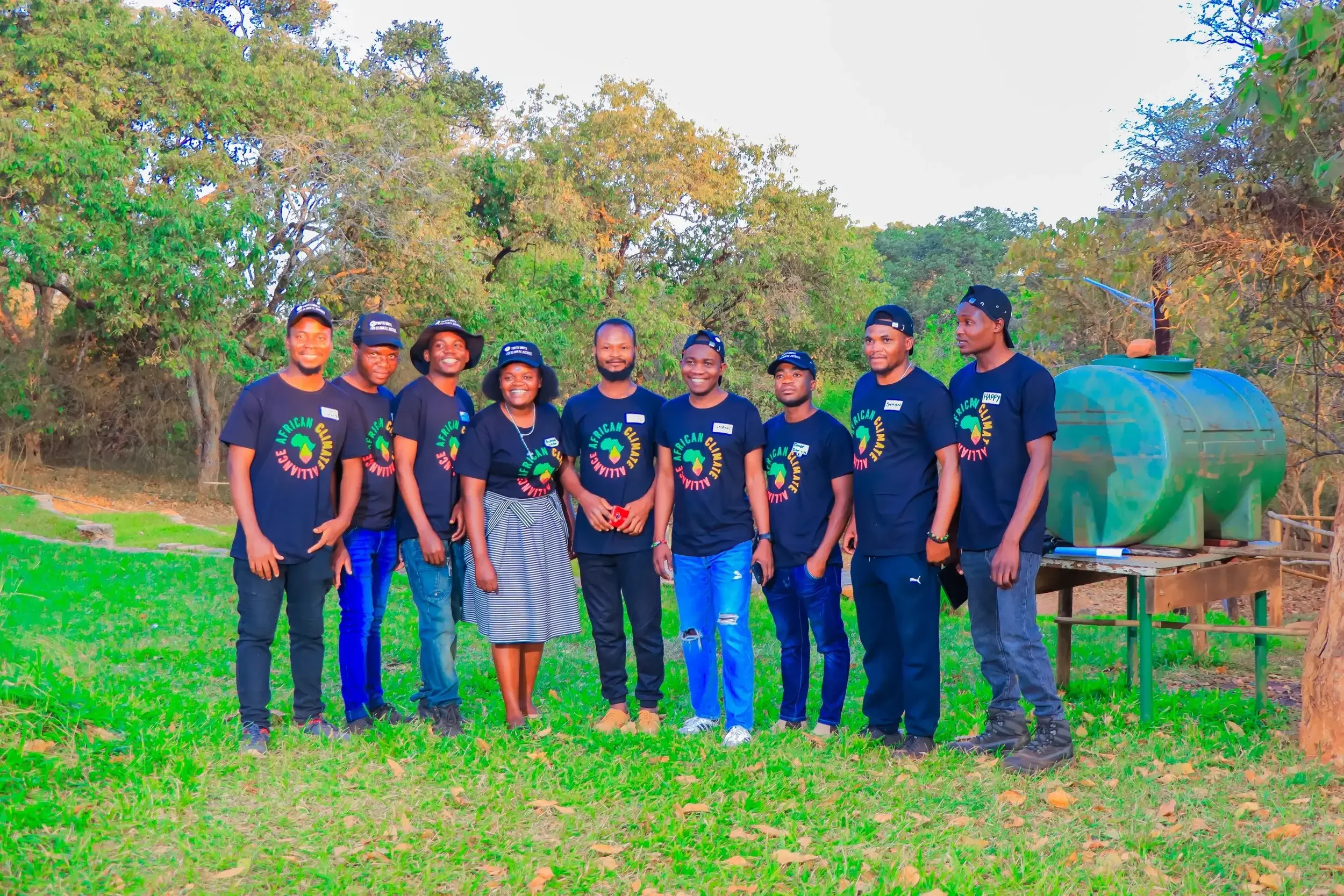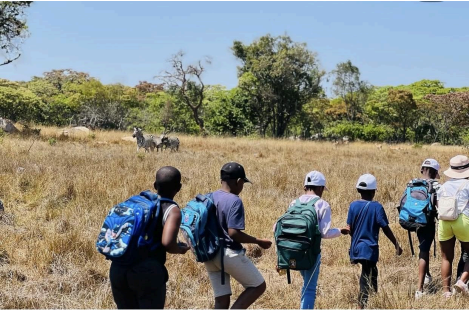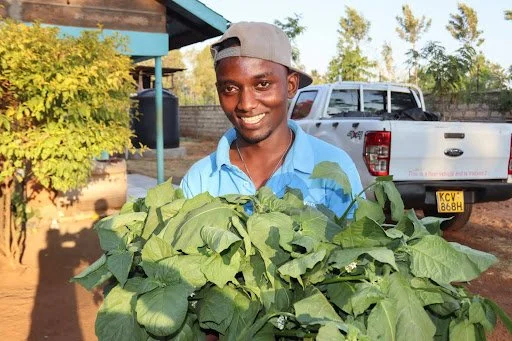9 African Climate Alliance Ambassadors Take Climate Action Using Literacy, Storytelling and Upskilling Projects
African Climate Alliance ambassadors at the recent Solidarity Gatherings in Malawi.
For the last four years, the African Climate Alliance has run a successful ambassador programme, creating opportunities for young climate activists in Africa to make a true and lasting impact in their communities. Using a mix of educational workshops, skillsbuilding, and mentorship, each year the programme trains a cohort of 20 African youth to help them understand the realities of climate change, the risks on the continent, and how this relates to their lives.
It reminds these young people that they have the potential to be superheroes with the power to halt the trajectory of the climate crisis in their communities. And collectively, when their efforts are combined across the continent, their small pockets of change can lead to lasting change that will be felt not just on the continent but across the entire world.
Over the years we have seen first hand the growth that these young leaders have undergone to gain the requisite leadership skill to lead the change of socio-environmental change in their parts of the world. Through practical training, mentorship and collective learning the programme has empowered these emergent leaders to build their own projects that make a direct intervention in the sphere of climate justice.
The 2024/2025 Ambassador cohort recently successfully completed their programme with the implementation of their own ambassador projects. Many of these projects function in the categories of climate literacy; educating other young people in their communities about climate change, storytelling for climate change; using storytelling to build the next generation of climate activists through the power of stories, and finally using that knowledge to build climate resilient skill-sets.
Learn more about the projects below!
Climate Literacy Projects
Climate Change Education for Primary School Students by Daniel Chinyama — Malawi
This project was led by Daniel Chinyama, who believes that fighting for climate justice is the foundation of a just and equitable society. The project aimed to introduce, educate, and inform young people about climate change, inspire ways in which they can create sustainable behaviors, leading to youth and children adopting environmentally friendly behaviors in their homes, schools, and communities.
Daniel ran an environmental awareness program for primary school students from four different primary schools in Mulanje at Zimbo Primary School. The other three schools are Chigombe Primary School, Bvunduli Primary School, and Kabichi Primary School. “The project has strengthened ties between the school, community group, and environmental organisation. It has also raised community awareness about the significance of climate change education,” said Daniel.
“What surprised me the most was the keen interest by students to learn more about climate change. The students showed a greater interest in the program than I anticipated.”
Climate Change for Dummies by Christina Madzinga — Zimbabwe
Christina organised a two day series of lessons and interactive sessions aimed at equipping young people aged 11-15 with the basic understanding and knowledge of climate change as a concept. The programme taught the young children practical ways in which they can make a difference. One such practical skill is how to harness the power of the sun to boil water and fry an egg as well as how to utilise natural cool solutions when it's hot.
Young children who took part in Christina’s project hiking at a conservation park in Harare.
The other part of this educational programme includes giving the children exposure to one of the very few conservation parks in the CBD in Harare. “By seeing one of the few conservation parks so close to the CBD, as well as the beauty in the environment and understanding how climate change affects these, I think we were able to inspire the young ones to feel the need to conserve the environment,” said Christina.
Children Learning Climate by Simeon Kalua — Malawi
Simeon designed a project that targeted 40 learners directly through climate education sessions, while indirectly targeting 1200 learners through an awareness campaign that was facilitated by the 40 learners at Phereni Primary School in Njewa Zone, Lilongwe Rural West District. Through the project, children gained a foundational understanding of climate change, and practical information on how climate change is impacting Malawian communities, such as erratic rainfall, droughts, floods, and soil erosion.
For Simeon, the biggest surprise was the immense resourcefulness and existing knowledge within the children about climate change.
“The project team’s assumption was that ‘climate change’ might be a new word to many children at Phereni primary school given that the school is located in a rural area, but surprisingly children have practical understanding of climate change.”
Climate Action Drive by Anesu Kahari — Zimbabwe
Anesu initiated the project to empower young people with knowledge and skills related to climate change and sustainable waste management. The goal she had in mind was to promote environmental responsibility and long-term stewardship among youth. By raising awareness and engaging students in hands-on learning, the project aimed to inspire behavioral change and community-driven environmental action that could extend beyond the classroom.
The programme included a comprehensive climate education workshop where students were introduced to key concepts, including the causes, effects, and solutions to climate change, particularly within the local and regional context. Following the educational session, students were divided into groups to create educational posters and charts reflecting what they had learned.
Storytelling Projects
Green Revolution Now! By Alive Gxwala and Ahluma Pangeni — South Africa
Alive and Ahluma partnered up to create ‘Green Revolution Now’, a project that was anchored around the power of storytelling, not only as an educational tool but as a community-building asset. The duo created a social media profile under the name ‘Green Revolution Now’, where they posted educational content about climate change.
They aimed to spread awareness about the environmental crisis using primarily social media, but also reinforced this campaign by using workshops to educate and inspire action by engaging children through presentations and workshops. For Alive and Ahluma, the impact of this project was easily visible in their community.
“It helped members of our community, starting from as young as 12 years old, to be exposed to the concept of climate justice, helping them learn about the cause and understand its importance. It inspired us to motivate young lives to take part in the fight for climate justice.”
Rising Voices: How Girls and Women in Cape Town Are Fighting Back Against Climate Change by Inaminkosi Maswana — South Africa
Inaminnkosi built a project that sought to highlight and highlight and amplify the voices of girls and women in Cape Town—particularly in Khayelitsha and Rondebosch—who have felt the real impact of climate change. By showcasing their experiences through storytelling and a workshop, the project aimed to promote intersectional climate justice and empower young girls as change agents in their communities.
On a personal level, the project built Inaminkosi’s conviction that storytelling is a powerful tool for change-making. “I’ve grown more confident in using storytelling as a form of activism, and I want to keep using this method to build awareness and solidarity,” she said.
‘Mizizi ya Ubunifu’ by Cece Nyawira Maina — Kenya
Cece's project made use of design and social media as a vehicle for storytelling and raising awareness on climate change, environmental conservation, pollution, and sustainability. It was tethered by a desire to develop collective action in communities in Kenya and beyond using social media.
Using an Instagram page, under the name ‘Mizizi ya Ubunifu’, Cece shared calls to action and guides to inspire climate activism and empower people to take action and lead sustainable lives.
“One of our campaigns on ‘Climate Activist Starter Pack’ reached over 5,000 people across Kenya, where I shared digital resources, demystified some climate science terminologies, and included a digital climate pledge for action.”
Climate Resilient Skills-Building Projects
Youth-Led Kitchen Gardening for Climate Resilience by Veronica Judith Mwende — Kenya
Veronica led a project aimed at equipping youth and women in Kaiti with practical skills in climate-smart agriculture. Participants in her community were introduced to low-cost, water-efficient gardening systems that can thrive in small spaces and through changing climate conditions.
A young person with some of the fresh produce that were harvested through Judith’s Project.
They were provided with kitchen garden containers, which were used to successfully plant leafy vegetables such as kale and spinach. The project trained 35 youth and women who attended the sessions. Veronica says the project taught her that the project taught her that she can achieve anything she puts her mind to.
“I am capable of leading change, even with limited resources. I developed stronger leadership, communication, and problem-solving skills. Most importantly, I realised the power of youth-led action and how much impact one committed idea can make when shared with others”
Climate Resilience Advocacy for Local Governance by Theresa — Zambia
Theresa developed a policy development and engagement project called ‘Resilience Advocacy for Local Governance in Zambia’. The project ran over three months from February to April 2025. This project aimed to influence local governance structures to adopt sustainable and climate-resilient practices while raising awareness and engaging with other stakeholders.
Using a combination of research, community engagement, advocacy, and stakeholder dialogue, the project successfully contributed to building a more informed and resilient local governance framework responsive to the challenges of climate change. A key success of this project was the development of a policy brief titled “Integrating Climate Resilience into Local Governance: Practical Guidelines for Zambia’s Local Authorities”, which was reviewed and endorsed by three local government representatives and shared with relevant ministries.










